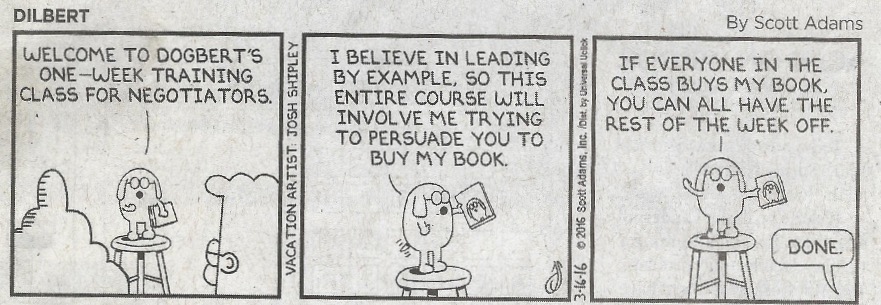We spend much of our time in negotiations – trying to reach agreement with colleagues or those outside Government. This note provides advice that should be borne in mind if the negotiations seem likely to be important and/or difficult.
First, you need to understand the difference between the two key types of negotiation:
- Win at all costs, or
- Achieve mutual benefit.
Is one party setting out “to win”, not worrying about the fairness of the outcome, nor interested in a long term relationship with the other party? Is one party willing, if necessary, to force through their preferred result? If so, then you probably need to be familiar with game theory, auction theory, and other tactical and strategic tactics. You could do worse than start by reading Thomas Schelling’s “The Strategy of Conflict” – as readable, relevant and thought provoking today as when it was first published back in the 1960s.
Hopefully, however, you will be negotiating with those who want to maintain a satisfactory long-term relationship and to reach a durable agreement that fairly resolves conflicting interests. If so, then read on!
Thorough planning is essential. You need to think carefully about all aspects of the issue, and the likely concerns of the other parties, or you will be surprised and out-maneuvered at each stage. Make sure in particular that you know all the relevant facts. Make sure, too, that you have a good idea of what drives your Minister and how they would react if they were at the negotiating table. Do you know the limits of your negotiating power? In what circumstances do you need to refer back to Ministers and/or others in Government?
You must establish your minimum and maximum requirements – i.e. the area within which you are free to negotiate. You must decide in advance that, if you do not reach your minimum requirements, you will have to walk away without agreement. Your minimum requirements should therefore be the result of a logical review of the situation in which you find yourself, and should be agreed with those to whom you are reporting. Try to avoid using the phrase ‘bottom line’. This means different things to different people, and is often no more than the current limit of your negotiating brief, i.e. the point at which you have to report back to others. If there are no circumstances in which you can walk away from the negotiation, then you should be clear about this from the beginning.
Take time to examine the issue through the eyes of the other parties. In particular, what are their likely minimum and maximum requirements, including non-negotiables? Listen carefully to what they say during the negotiation. You need to identify areas of common ground so that you can have a negotiation that maximises the benefit to all the parties.
You should set out to manage the process, ensuring that all the issues are identified and dealt with in a business-like way. Keep recording and reviewing what has been agreed so that there can be no misunderstanding, and so that the area of disagreement is steadily reduced.
Be up-front about non-negotiables but otherwise generally avoid being either ‘tough’ or ‘nice’. The first, if met by toughness, will only lead to deadlock. The second will lead to your arriving at an unfair result, unless all the other parties also act nice – which is unlikely. Try to defuse heated argument. The best approach is usually to be sensitive to the other people, but resolute about the problem. If apparently deadlocked, consider offering a face-saver (without going below your minimum requirements). Or be creative. Surprise the other parties by coming at the issue in a totally different way.
Finally, and this is important, always call a short adjournment when you appear to have reached agreement but before settling on it. You need to reflect on what you have agreed to make sure that it is sensible, fair and consistent with your negotiating brief. You also need to ensure that you have dealt with all the issues and have not left any uncertainties or ambiguities.
Alternatively, Dogbert's approach can be very effective ...
